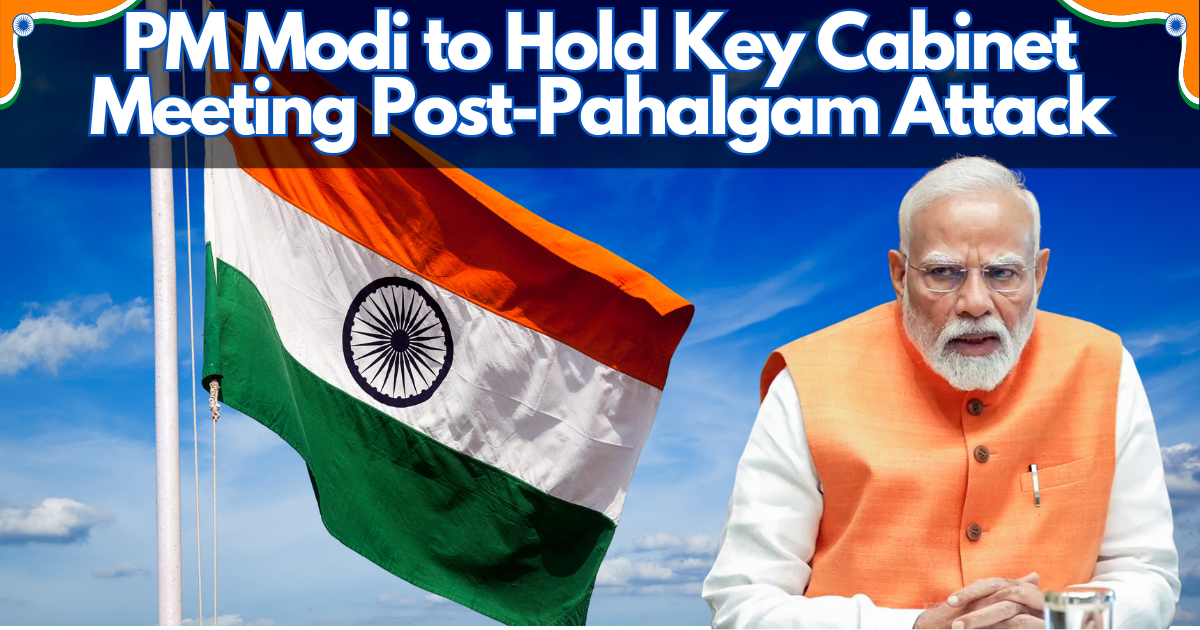PM Modi to Hold Key Cabinet Meeting Post-Pahalgam Attack. Prime Minister Narendra Modi will hold a meeting of the Union Council of Ministers on Wednesday, the first after the Pahalgam terror attack and the subsequent Operation Sindoor, officials said. The meeting is also being held as the Modi 3.0 government completes one year in office this month. The Council of Ministers meets every three months, where the implementation of key government policies is discussed threadbare in the presence of top bureaucrats. To know more about the topic “PM Modi to Hold Key Cabinet Meeting Post-Pahalgam Attack,” read the complete article.
PM Modi to Hold Key Cabinet Meeting Post-Pahalgam Attack
The significant meeting of the Cabinet Committee on Security (CCS), chaired by Prime Minister Narendra Modi, was held on Wednesday, following the April 22 terrorist attack in Pahalgam that claimed 26 lives. The CCS, along with the Cabinet Committee on Political Affairs (CCPA) and the Cabinet Committee on Economic Affairs (CCEA), met at the Prime Minister’s residence in New Delhi. The CCS meeting focused on reviewing security preparedness in the aftermath of the Pahalgam attack. A cabinet briefing is scheduled for 4:00 pm.

In its previous press conference, the CCS pointed out “cross-border linkages” to the Pahalgam attack and declared a series of harsh measures against Pakistan. These included the suspension of the Indus Treaty, closure of the Integrated Check Post at Attari, revocation of visas for Pakistani nationals, and a decrease in the diplomatic presence of the Pakistan High Commission in New Delhi.
“The CSS resolved that perpetrators of the Pahalgam attack will be brought to justice and their sponsors held to account. India will be unrelenting in pursuit of those who have committed acts of terror or conspired to make them possible,” Foreign Secretary Vikram Misri said during a special press conference on April 23.
Operation Sindoor
In the early morning hours of May 7, the Indian Armed Forces launched Operation Sindoor, striking nine terror hubs situated in Pakistan and Pakistan-occupied Jammu and Kashmir (PoK). These comprised the Jaish-e-Mohammad stronghold in Bahawalpur and the Lashkar-e-Taiba base in Muridke. The operation, named “Operation Sindoor,” was executed two weeks after the brutal killing of 26 civilians in Jammu and Kashmir’s Pahalgam.
This exacting operation was initiated in direct response to the brutal terror attack on April 22 in Pahalgam, Jammu and Kashmir, which took the lives of 26 civilians, including a Nepali national. India’s precise strikes on nine terror sites in Pakistan and Pakistan-occupied Kashmir, followed by its counterattack on the neighboring country’s military facilities, especially air bases, have been a highlight of Modi’s recent speeches.
He has confirmed that Operation Sindoor has established India’s “new normal” in pursuing terror acts linked to Pakistan and vowed to go after terrorists and their sponsors with equal ferocity in case of any future terror incidents on Indian soil.
Overall Security Situation at CCS
The CCS, chaired by Prime Minister Narendra Modi, is understood to have discussed the overall security situation in Jammu and Kashmir amid speculations about India’s possible retaliation for the Pahalgam terror attack, given its cross-border linkages, news agency PTI said. The CCS meeting was held at the Prime minister’s Lok Kalyan Marg residence. In Tuesday’s meeting, the PM had accorded operational freedom to the armed forces on the “mode, targets, and timing” of India’s response to the April 22 attack.
There is no official statement yet on the CCS held on Wednesday amid increasing signs of a reprisal against Pakistan. In the first CCS meeting on April 23, it was decided to take a broad range of punitive measures against Pakistan, including suspension of the Indus Water Treaty, shutting down of the only operational land border crossing at Attari and downgrading of diplomatic ties with Pakistan.
Importance of CCPA Meeting
The Cabinet Committee of Political Affairs (CCPS) last convened following the terrorist attack in Pulwama, Jammu and Kashmir, in 2019. The meeting was held to assess the security situation and develop counter-strategies. During that session, the committee approved the withdrawal of the Most Favored Nation status granted to Pakistan. Subsequently, on 26 February 2019, the Indian Air Force conducted airstrikes on terror camps in Balakot.
Apart from the PM, the CCPA includes Defence Minister Rajnath Singh, Home Minister Amit Shah, Road Transport Minister Nitin Gadkari, Finance Minister Nirmala Sitharaman, and Commerce Minister Piyush Goyal.



